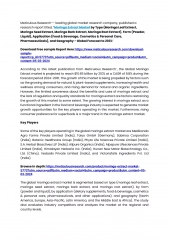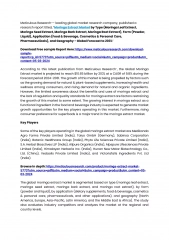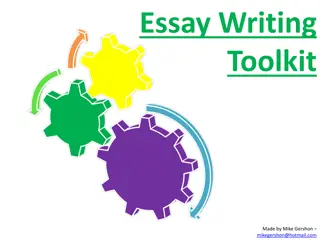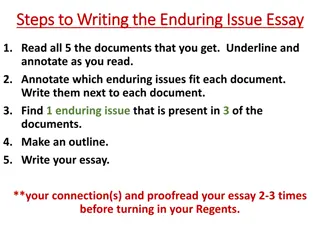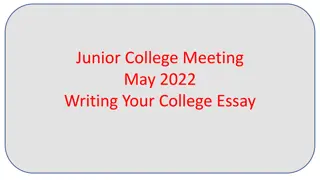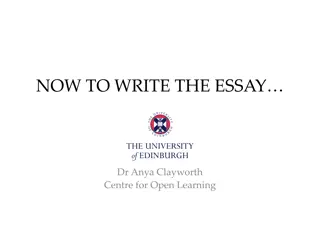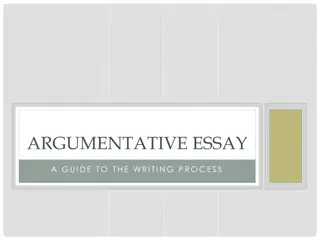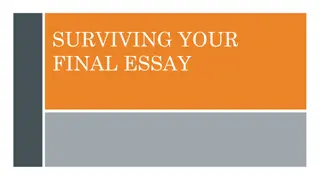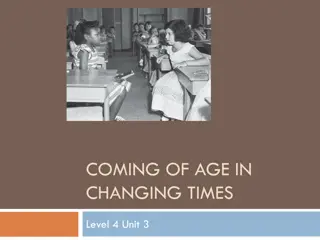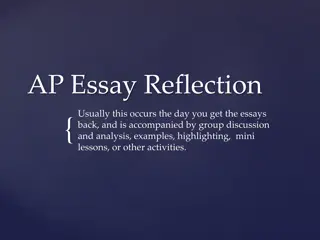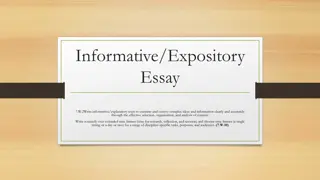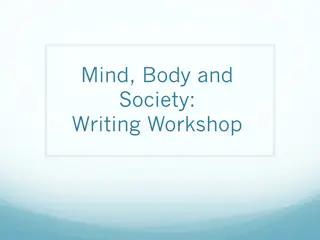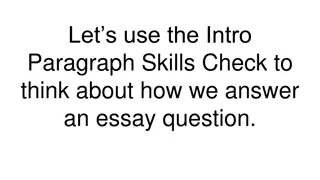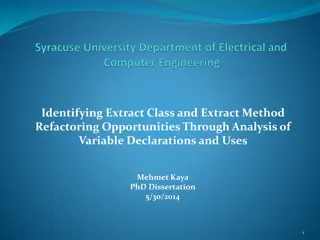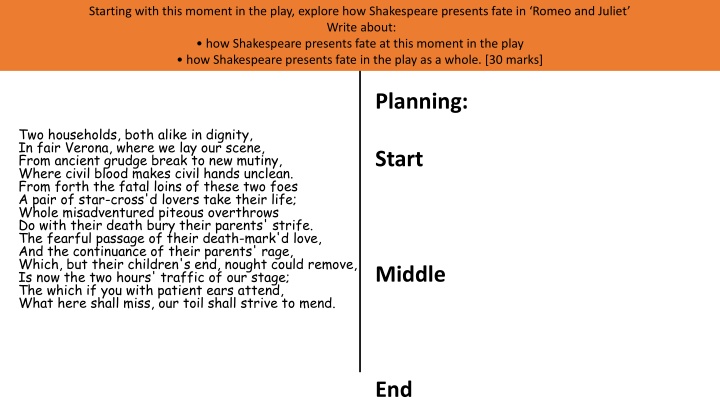
Shakespeare's Exploration of Fate, Law and Order, and Romeo's Emotions in Romeo and Juliet
Discover Shakespeare's intricate portrayal of fate, law and order, and Romeo's emotions in Romeo and Juliet. Delve into how fate unfolds at critical moments, the enforcement of law and order, and the depths of Romeo's emotional turmoil throughout the play.
Download Presentation

Please find below an Image/Link to download the presentation.
The content on the website is provided AS IS for your information and personal use only. It may not be sold, licensed, or shared on other websites without obtaining consent from the author. If you encounter any issues during the download, it is possible that the publisher has removed the file from their server.
You are allowed to download the files provided on this website for personal or commercial use, subject to the condition that they are used lawfully. All files are the property of their respective owners.
The content on the website is provided AS IS for your information and personal use only. It may not be sold, licensed, or shared on other websites without obtaining consent from the author.
E N D
Presentation Transcript
Starting with this moment in the play, explore how Shakespeare presents fate in Romeo and Juliet Write about: how Shakespeare presents fate at this moment in the play how Shakespeare presents fate in the play as a whole. [30 marks] Planning: Two households, both alike in dignity, In fair Verona, where we lay our scene, From ancient grudge break to new mutiny, Where civil blood makes civil hands unclean. From forth the fatal loins of these two foes A pair of star-cross'd lovers take their life; Whole misadventured piteous overthrows Do with their death bury their parents' strife. The fearful passage of their death-mark'd love, And the continuance of their parents' rage, Which, but their children's end, nought could remove, Is now the two hours' traffic of our stage; The which if you with patient ears attend, What here shall miss, our toil shall strive to mend. Start Middle End
Starting with this moment in the play, explore how Shakespeare presents law and order in Romeo and Juliet Write about: how Shakespeare presents law and order at this moment in the play how Shakespeare presents law and order in the play as a whole. [30 marks] Act 1 Scene 1 Enter PRINCE ESCALUS, with his train PRINCE ESCALUS enters with his escort. Planning: PRINCE Rebellious subjects, enemies to peace, Profaners of this neighbor-stain d steel! Will they not hear? What, ho! You men, you beasts, That quench the fire of your pernicious rage With purple fountains issuing from your veins, On pain of torture, from those bloody hands Throw your mistempered weapons to the ground, And hear the sentence of your mov d prince. Three civil brawls, bred of an airy word, By thee, old Capulet, and Montague, Have thrice disturbed the quiet of our streets And made Verona s ancient citizens Cast by their grave-beseeming ornaments, To wield old partisans in hands as old, Cankered with peace, to part your cankered hate. If ever you disturb our streets again, Your lives shall pay the forfeit of the peace. For this time, all the rest depart away. You, Capulet, shall go along with me, And, Montague, come you this afternoon To know our farther pleasure in this case, To old Free-town, our common judgment-place. Once more, on pain of death, all men depart. Start Middle End
Starting with this moment in the play, explore how Shakespeare presents Romeos emotions in Romeo and Juliet Write about: how Shakespeare presents Romeo s emotions at this moment in the play how Shakespeare presents Romeo s emotions in the play as a whole. [30 marks] Act 1 Scene 1 BENVOLIO Then she hath sworn that she will still live chaste? ROMEO She hath, and in that sparing makes huge waste, For beauty starved with her severity Cuts beauty off from all posterity. She is too fair, too wise, wisely too fair, To merit bliss by making me despair: She hath forsworn to love, and in that vow Do I live dead that live to tell it now. BENVOLIO Be ruled by me, forget to think of her. ROMEO O, teach me how I should forget to think. BENVOLIO By giving liberty unto thine eyes; Examine other beauties. ROMEO 'Tis the way To call hers exquisite, in question more: These happy masks that kiss fair ladies' brows Being black put us in mind they hide the fair; He that is strucken blind cannot forget The precious treasure of his eyesight lost: Show me a mistress that is passing fair, What doth her beauty serve, but as a note Where I may read who pass'd that passing fair? Farewell: thou canst not teach me to forget. BENVOLIO I'll pay that doctrine, or else die in debt. Exeunt Planning: Start Middle End
Starting with this moment in the play, explore how Shakespeare presents the Capulet and Montague feud in Romeo and Juliet Write about: how Shakespeare presents the Capulet and Montague feud at this moment in the play how Shakespeare presents the Capulet and Montague feud in the play as a whole. [30 marks] ACT I SCENE II A street. Enter CAPULET, PARIS, and Servant. CAPULET But Montague is bound as well as I, In penalty alike; and 'tis not hard, I think, For men so old as we to keep the peace. PARIS Of honourable reckoning are you both; And pity 'tis you lived at odds so long. But now, my lord, what say you to my suit? CAPULET But saying o'er what I have said before: My child is yet a stranger in the world; She hath not seen the change of fourteen years, Let two more summers wither in their pride, Ere we may think her ripe to be a bride. PARIS Younger than she are happy mothers made. CAPULET And too soon marr'd are those so early made. The earth hath swallow'd all my hopes but she, She is the hopeful lady of my earth: But woo her, gentle Paris, get her heart, My will to her consent is but a part; An she agree, within her scope of choice lies my consent and fair according voice. This night I hold an old accustom'd feast, Whereto I have invited many a guest, Such as I love; and you, among the store, One more, most welcome, makes my number more. At my poor house look to behold this night Planning: Start Middle End
Act 1 Scene 3 LADY CAPULET Marry, that 'marry' is the very theme I came to talk of. Tell me, daughter Juliet, How stands your disposition to be married? JULIET It is an honour that I dream not of. Nurse An honour! were not I thine only nurse, I would say thou hadst suck'd wisdom from thy teat. LADY CAPULET Well, think of marriage now; younger than you, Here in Verona, ladies of esteem, Are made already mothers: by my count, I was your mother much upon these years That you are now a maid. Thus then in brief: The valiant Paris seeks you for his love. Nurse A man, young lady! lady, such a man As all the world--why, he's a man of wax. LADY CAPULET Verona's summer hath not such a flower. Nurse Nay, he's a flower; in faith, a very flower. LADY CAPULET What say you? can you love the gentleman? This night you shall behold him at our feast; Read o'er the volume of young Paris' face, And find delight writ there with beauty's pen; Examine every married lineament, And see how one another lends content And what obscured in this fair volume lies Find written in the margent of his eyes. This precious book of love, this unbound lover, To beautify him, only lacks a cover: The fish lives in the sea, and 'tis much pride For fair without the fair within to hide: That book in many's eyes doth share the glory, That in gold clasps locks in the golden story; So shall you share all that he doth possess, By having him, making yourself no less. Nurse No less! nay, bigger; women grow by men. LADY CAPULET Speak briefly, can you like of Paris' love? JULIET I'll look to like, if looking liking move: But no more deep will I endart mine eye Than your consent gives strength to make it fly. Starting with this moment in the play, explore how Shakespeare presents marriage in Romeo and Juliet Write about: how Shakespeare presents marriage at this moment in the play how Shakespeare presents marriage in the play as a whole. [30 marks] Planning: Start Middle End
Starting with this moment in the play, explore how Shakespeare presents masculinity in Romeo and Juliet Write about: how Shakespeare presents masculinity at this moment in the play how Shakespeare presents masculinity in the play as a whole. [30 marks] ACT 1 SCENE 4 MERCUTIO Nay, gentle Romeo, we must have you dance. ROMEO Not I, believe me: you have dancing shoes With nimble soles: I have a soul of lead So stakes me to the ground I cannot move. MERCUTIO You are a lover; borrow Cupid's wings, And soar with them above a common bound. ROMEO I am too sore enpierced with his shaft To soar with his light feathers, and so bound, I cannot bound a pitch above dull woe: Under love's heavy burden do I sink. MERCUTIO And, to sink in it, should you burden love; Too great oppression for a tender thing. ROMEO Is love a tender thing? it is too rough, Too rude, too boisterous, and it pricks like thorn. MERCUTIO If love be rough with you, be rough with love; Prick love for pricking, and you beat love down. Give me a case to put my visage in: A visor for a visor! what care I What curious eye doth quote deformities? Here are the beetle brows shall blush for me. BENVOLIO Come, knock and enter; and no sooner in, But every man betake him to his legs. Planning: Start Middle End
Act 1 Scene 5 ROMEO O, she doth teach the torches to burn bright! It seems she hangs upon the cheek of night Like a rich jewel in an Ethiope's ear; Beauty too rich for use, for earth too dear! So shows a snowy dove trooping with crows, As yonder lady o'er her fellows shows. The measure done, I'll watch her place of stand, And, touching hers, make blessed my rude hand. Did my heart love till now? forswear it, sight! For I ne'er saw true beauty till this night. (Tybalt speaking to Capulet about Romeo gatecrashing the party) ROMEO [To JULIET] If I profane with my unworthiest hand This holy shrine, the gentle fine is this: My lips, two blushing pilgrims, ready stand To smooth that rough touch with a tender kiss. JULIET Good pilgrim, you do wrong your hand too much, Which mannerly devotion shows in this; For saints have hands that pilgrims' hands do touch, And palm to palm is holy palmers' kiss. ROMEO Have not saints lips, and holy palmers too? JULIET Ay, pilgrim, lips that they must use in prayer. ROMEO O, then, dear saint, let lips do what hands do; They pray, grant thou, lest faith turn to despair. JULIET Saints do not move, though grant for prayers' sake. ROMEO Then move not, while my prayer's effect I take. Thus from my lips, by yours, my sin is purged. JULIET Then have my lips the sin that they have took. ROMEO Sin from thy lips? O trespass sweetly urged! Give me my sin again. JULIET You kiss by the book. Starting with this moment in the play, explore how Shakespeare presents romantic love in Romeo and Juliet Write about: how Shakespeare presents romantic love at this moment in the play how Shakespeare presents romantic love in the play as a whole. [30 marks] Planning: Start Middle End
Starting with this moment in the play, explore how Shakespeare foreshadows the untimely deaths of both protagonists in Romeo and Juliet Write about: how Shakespeare foreshadows the untimely deaths of both protagonists at this moment in the play how Shakespeare foreshadows the untimely deaths of both protagonists in the play as a whole. [30 marks] Planning: (Enter Chorus) Chorus Now old desire doth in his death-bed lie, And young affection gapes to be his heir; That fair for which love groan'd for and would die, With tender Juliet match'd, is now not fair. Now Romeo is beloved and loves again, Alike betwitched by the charm of looks, But to his foe supposed he must complain, And she steal love's sweet bait from fearful hooks: Being held a foe, he may not have access To breathe such vows as lovers use to swear; And she as much in love, her means much less To meet her new-beloved any where: But passion lends them power, time means, to meet Tempering extremities with extreme sweet. (Exit) Start Middle End
Starting with this moment in the play, explore how Shakespeare presents male friendship in Romeo and Juliet Write about: how Shakespeare presents male friendship at this moment in the play how Shakespeare presents male friendship in the play as a whole. [30 marks] Planning: Act 2 Scene 1 BENVOLIO Come, he hath hid himself among these trees, To be consorted with the humorous night: Blind is his love and best befits the dark. MERCUTIO If love be blind, love cannot hit the mark. Now will he sit under a medlar tree, And wish his mistress were that kind of fruit As maids call medlars, when they laugh alone. Romeo, that she were, O, that she were An open et caetera, thou a poperin pear! Romeo, good night: I'll to my truckle-bed; This field-bed is too cold for me to sleep: Come, shall we go? BENVOLIO Go, then; for 'tis in vain To seek him here that means not to be found. Start Middle End
Starting with this moment in the play, explore how Shakespeare presents impetuous behaviour in Romeo and Juliet Write about: how Shakespeare presents impetuous behaviour at this moment in the play how Shakespeare presents impetuous behaviour in the play as a whole. [30 marks] ACT 2 SCENE 2 ROMEO He jests at scars that never felt a wound. (JULIET appears above at a window) But, soft! what light through yonder window breaks? It is the east, and Juliet is the sun. Arise, fair sun, and kill the envious moon, Who is already sick and pale with grief, That thou her maid art far more fair than she: Be not her maid, since she is envious; Her vestal livery is but sick and green And none but fools do wear it; cast it off. It is my lady, O, it is my love! O, that she knew she were! She speaks yet she says nothing: what of that? Her eye discourses; I will answer it. I am too bold, 'tis not to me she speaks: Two of the fairest stars in all the heaven, Having some business, do entreat her eyes To twinkle in their spheres till they return. What if her eyes were there, they in her head? The brightness of her cheek would shame those stars, As daylight doth a lamp; her eyes in heaven Would through the airy region stream so bright That birds would sing and think it were not night. See, how she leans her cheek upon her hand! O, that I were a glove upon that hand, That I might touch that cheek! JULIET Ay me! Impetuous behaviour = sudden, rash and impulsive governed by emotion Planning: Start Middle End
Starting with this moment in the play, explore how Shakespeare presents the conflict evident in religion in Romeo and Juliet Write about: how Shakespeare presents the conflict evident in religion at this moment in the play how Shakespeare presents the conflict evident in religion in the play as a whole. [30 marks] ACT 2 SCENE 3 FRIAR LAURENCE The grey-eyed morn smiles on the frowning night, Chequering the eastern clouds with streaks of light, And flecked darkness like a drunkard reels From forth day's path and Titan's fiery wheels: Now, ere the sun advance his burning eye, The day to cheer and night's dank dew to dry, I must up-fill this osier cage of ours With baleful weeds and precious-juiced flowers. The earth that's nature's mother is her tomb; What is her burying grave that is her womb, And from her womb children of divers kind We sucking on her natural bosom find, Many for many virtues excellent, None but for some and yet all different. O, mickle is the powerful grace that lies In herbs, plants, stones, and their true qualities: For nought so vile that on the earth doth live But to the earth some special good doth give, Nor aught so good but strain'd from that fair use Revolts from true birth, stumbling on abuse: Virtue itself turns vice, being misapplied; And vice sometimes by action dignified. Within the infant rind of this small flower Poison hath residence and medicine power: For this, being smelt, with that part cheers each part; Being tasted, slays all senses with the heart. Two such opposed kings encamp them still In man as well as herbs, grace and rude will; And where the worser is predominant, Full soon the canker death eats up that plant. Planning: Start Middle End
Starting with this moment in the play, explore how Shakespeare presents male characters in Romeo and Juliet Write about: how Shakespeare presents male characters at this moment in the play how Shakespeare presents male characters in the play as a whole. [30 marks] ACT 2 Scene 4 MERCUTIO The pox of such antic, lisping, affecting fantasticoes; these new tuners of accents! 'By Jesu, a very good blade! a very tall man! a very good whore!' Why, is not this a lamentable thing, grandsire, that we should be thus afflicted with these strange flies, these fashion-mongers, these perdona-mi's, who stand so much on the new form, that they cannot at ease on the old bench? O, their bones, their bones! (Enter ROMEO) BENVOLIO Here comes Romeo, here comes Romeo. MERCUTIO Without his roe, like a dried herring: flesh, flesh, how art thou fishified! Now is he for the numbers that Petrarch flowed in: Laura to his lady was but a kitchen-wench; marry, she had a better love to be-rhyme her; Dido a dowdy; Cleopatra a gipsy; Helen and Hero hildings and harlots; Thisbe a grey eye or so, but not to the purpose. Signior Romeo, bon jour! there's a French salutation to your French slop. You gave us the counterfeit fairly last night. ROMEO Good morrow to you both. What counterfeit did I give you? MERCUTIO The slip, sir, the slip; can you not conceive? ROMEO Pardon, good Mercutio, my business was great; and in such a case as mine a man may strain courtesy. Planning: Start Middle End
Starting with this moment in the play, explore how Shakespeare presents the relationship between Juliet and the nurse in Romeo and Juliet Write about: how Shakespeare presents the relationship between Juliet and the nurse at this moment in the play how Shakespeare presents the relationship between Juliet and the nurse in the play as a whole. [30 marks] Act 2 Scene 5 JULIET I' faith, I am sorry that thou art not well. Sweet, sweet, sweet nurse, tell me, what says my love? Nurse Your love says, like an honest gentleman, and a courteous, and a kind, and a handsome, and, I warrant, a virtuous, Where is your mother? JULIET Where is my mother! why, she is within; Where should she be? How oddly thou repliest! 'Your love says, like an honest gentleman, Where is your mother?' Nurse O God's lady dear! Are you so hot? marry, come up, I trow; Is this the poultice for my aching bones? Henceforward do your messages yourself. JULIET Here's such a coil! come, what says Romeo? Nurse Have you got leave to go to shrift to-day? JULIET I have. Nurse Then hie you hence to Friar Laurence' cell; There stays a husband to make you a wife: Now comes the wanton blood up in your cheeks, They'll be in scarlet straight at any news. Hie you to church; I must another way, To fetch a ladder, by the which your love Must climb a bird's nest soon when it is dark: I am the drudge and toil in your delight, But you shall bear the burden soon at night. Go; I'll to dinner: hie you to the cell. JULIET Hie to high fortune! Honest nurse, farewell. (Exeunt) Planning: Start Middle End
Starting with this moment in the play, explore how Shakespeare presents the behaviour of Romeo and Juliet towards each other in Romeo and Juliet Write about: how Shakespeare presents the behaviour of Romeo and Juliet towards each other at this moment in the play how Shakespeare presents the behaviour of Romeo and Juliet towards each other in the play as a whole. [30 marks] ACT 2 SCENE 6 JULIET Good even to my ghostly confessor. FRIAR LAURENCE Romeo shall thank thee, daughter, for us both. JULIET As much to him, else is his thanks too much. ROMEO Ah, Juliet, if the measure of thy joy Be heap'd like mine and that thy skill be more To blazon it, then sweeten with thy breath This neighbour air, and let rich music's tongue Unfold the imagined happiness that both Receive in either by this dear encounter. JULIET Conceit, more rich in matter than in words, Brags of his substance, not of ornament: They are but beggars that can count their worth; But my true love is grown to such excess I cannot sum up sum of half my wealth. FRIARLAURENCE Come, come with me, and we will make short work; For, by your leaves, you shall not stay alone Till holy church incorporate two in one. (Exeunt) Planning: Start Middle End
Starting with this moment in the play, explore how Shakespeare presents male aggression in Romeo and Juliet Write about: how Shakespeare male aggression at this moment in the play how Shakespeare presents male aggression in the play as a whole. [30 marks] Act 3 Scene 1 Enter TYBALT and others) TYBALT Follow me close, for I will speak to them. Gentlemen, good den: a word with one of you. MERCUTIO And but one word with one of us? couple it with something; make it a word and a blow. TYBALT You shall find me apt enough to that, sir, an you will give me occasion. MERCUTIO Could you not take some occasion without giving? TYBALT Mercutio, thou consort'st with Romeo,-- MERCUTIO Consort! what, dost thou make us minstrels? an thou make minstrels of us, look to hear nothing but discords: here's my fiddlestick; here's that shall make you dance. 'Zounds, consort! BENVOLIO We talk here in the public haunt of men: Either withdraw unto some private place, And reason coldly of your grievances, Or else depart; here all eyes gaze on us. MERCUTIO Men's eyes were made to look, and let them gaze; I will not budge for no man's pleasure, I. (Enter ROMEO) TYBALT Well, peace be with you, sir: here comes my man. MERCUTIO But I'll be hanged, sir, if he wear your livery: Marry, go before to field, he'll be your follower; Your worship in that sense may call him 'man.' TYBALT Romeo, the hate I bear thee can afford No better term than this,--thou art a villain. Planning: Start Middle End
Starting with this moment in the play, explore how Shakespeare presents Juliet in Romeo and Juliet Write about: how Shakespeare presents Juliet at this moment in the play how Shakespeare presents Juliet in the play as a whole. [30 marks] ACT 3 Scene 2 Nurse Ah, well-a-day! he's dead, he's dead, he's dead! We are undone, lady, we are undone! Alack the day! he's gone, he's kill'd, he's dead! JULIET Can heaven be so envious? Nurse Romeo can, Though heaven cannot: O Romeo, Romeo! Who ever would have thought it? Romeo! JULIET What devil art thou, that dost torment me thus? This torture should be roar'd in dismal hell. Hath Romeo slain himself? say thou but 'I,' And that bare vowel 'I' shall poison more Than the death-darting eye of cockatrice: I am not I, if there be such an I; Or those eyes shut, that make thee answer 'I.' If he be slain, say 'I'; or if not, no: Brief sounds determine of my weal or woe. Nurse I saw the wound, I saw it with mine eyes, God save the mark! here on his manly breast: A piteous corse, a bloody piteous corse; Pale, pale as ashes, all bedaub'd in blood, All in gore-blood; I swounded at the sight. JULIET O, break, my heart! poor bankrupt, break at once! To prison, eyes, ne'er look on liberty! Vile earth, to earth resign; end motion here; And thou and Romeo press one heavy bier! Nurse O Tybalt, Tybalt, the best friend I had! O courteous Tybalt! honest gentleman! That ever I should live to see thee dead! Planning: Start Middle End
Starting with this moment in the play, explore how Shakespeare presents justice in Romeo and Juliet Write about: how Shakespeare presents justice at this moment in the play how Shakespeare presents justice in the play as a whole. [30 marks] Act 3 Scene 3 FRIAR LAURENCE A gentler judgment vanish d from his lips, Not body s death, but body s banishment. ROMEO Ha, banishment! be merciful, say death; For exile hath more terror in his look, Much more than death: do not say banishment. FRIAR LAURENCE Hence from Verona art thou banished: Be patient, for the world is broad and wide. ROMEO There is no world without Verona walls, But purgatory, torture, hell itself. Hence-banished is banish d from the world, And world s exile is death: then banished, Is death mis-term d: calling death banishment, Thou cutt st my head off with a golden axe, And smilest upon the stroke that murders me. FRIAR LAURENCE O deadly sin! O rude unthankfulness! Thy fault our law calls death; but the kind prince, Taking thy part, hath rush d aside the law, And turn d that black word death to banishment: This is dear mercy, and thou seest it not. Justice = lawfulness or righteousness Planning: Start Middle End
Starting with this moment in the play, explore how Shakespeare presents patriarchy in Romeo and Juliet Write about: how Shakespeare presents patriarchy at this moment in the play how Shakespeare presents patriarchy in the play as a whole. [30 marks] Planning: ACT 3 SCENE 4 CAPULET Monday! ha, ha! Well, Wednesday is too soon, O Thursday let it be: o Thursday, tell her, She shall be married to this noble earl. Will you be ready? do you like this haste? We ll keep no great ado, a friend or two; For, hark you, Tybalt being slain so late, It may be thought we held him carelessly, Being our kinsman, if we revel much: Therefore we ll have some half a dozen friends, And there an end. But what say you to Thursday? PARIS My lord, I would that Thursday were to-morrow. CAPULET Well get you gone: o Thursday be it, then. Go you to Juliet ere you go to bed, Prepare her, wife, against this wedding-day. Farewell, my lord. Light to my chamber, ho! Afore me! it is so very very late, That we may call it early by and by. Good night. Exeunt Start Middle End
Starting with this moment in the play, explore how Shakespeare presents youthful optimism in Romeo and Juliet Write about: how Shakespeare presents youthful optimism at this moment in the play how Shakespeare presents youthful optimism in the play as a whole. [30 marks] ACT 3 SCENE 5 JULIET Wilt thou be gone? it is not yet near day: It was the nightingale, and not the lark, That pierced the fearful hollow of thine ear; Nightly she sings on yon pomegranate-tree: Believe me, love, it was the nightingale. ROMEO It was the lark, the herald of the morn, No nightingale: look, love, what envious streaks Do lace the severing clouds in yonder east: Night s candles are burnt out, and jocund day Stands tiptoe on the misty mountain tops. I must be gone and live, or stay and die. JULIET Yon light is not day-light, I know it, I: It is some meteor that the sun exhales, To be to thee this night a torch-bearer, And light thee on thy way to Mantua: Therefore stay yet; thou need st not to be gone. ROMEO Let me be ta en, let me be put to death; I am content, so thou wilt have it so. I ll say yon grey is not the morning s eye, Tisbut the pale reflex of Cynthia s brow; Nor that is not the lark, whose notes do beat The vaulty heaven so high above our heads: I have more care to stay than will to go: Come, death, and welcome! Juliet wills it so. How is t, my soul? let s talk; it is not day. youthful optimism = a tendency to look on the positive side of life due to youth Planning: Start Middle End
Starting with this moment in the play, explore how Shakespeare presents the role of Paris in Romeo and Juliet Write about: how Shakespeare presents the role of Paris at this moment in the play how Shakespeare presents the role of Paris in the play as a whole. [30 marks] ACT 4 SCENE 1 PARIS Immoderately she weeps for Tybalt s death, And therefore have I little talk d of love; For Venus smiles not in a house of tears. Now, sir, her father counts it dangerous That she doth give her sorrow so much sway, And in his wisdom hastes our marriage, To stop the inundation of her tears; Which, too much minded by herself alone, May be put from her by society: Now do you know the reason of this haste. FRIAR LAURENCE [Aside] I would I knew not why it should be slow d. Look, sir, here comes the lady towards my cell. Enter JULIET PARIS Happily met, my lady and my wife! JULIET That may be, sir, when I may be a wife. PARIS That may be must be, love, on Thursday next. JULIET What must be shall be. FRIAR LAURENCE That s a certain text. PARIS Come you to make confession to this father? JULIET To answer that, I should confess to you. PARIS Do not deny to him that you love me. Planning: Start Middle End
Starting with this moment in the play, explore how Shakespeare presents secrets and deception in Romeo and Juliet Write about: how Shakespeare presents secrets and deception at this moment in the play how Shakespeare presents secrets and deception in the play as a whole. [30 marks] Planning: ACT 4 Scene 2 Enter JULIET CAPULET How now, my headstrong! where have you been gadding? JULIET Where I have learn d me to repent the sin Of disobedient opposition To you and your behests, and am enjoin d By holy Laurence to fall prostrate here, And beg your pardon: pardon, I beseech you! Henceforward I am ever ruled by you. CAPULET Send for the county; go tell him of this: I ll have this knot knit up to-morrow morning. JULIET I met the youthful lord at Laurence cell; And gave him what becomed love I might, Not step o er the bounds of modesty. Start Middle End
ACT 4 Scene 3 JULIET Farewell! God knows when we shall meet again. I have a faint cold fear thrills through my veins, That almost freezes up the heat of life: I ll call them back again to comfort me: Nurse! What should she do here? My dismal scene I needs must act alone. Come, vial. What if this mixture do not work at all? Shall I be married then to-morrow morning? No, no: this shall forbid it: lie thou there. Laying down her dagger What if it be a poison, which the friar Subtly hath minister d to have me dead, Lest in this marriage he should be dishonour d, Because he married me before to Romeo? I fear it is: and yet, methinks, it should not, For he hath still been tried a holy man. How if, when I am laid into the tomb, I wake before the time that Romeo Come to redeem me? there s a fearful point! Shall I not, then, be stifled in the vault, To whose foul mouth no healthsome air breathes in, And there die strangled ere my Romeo comes? Or, if I live, is it not very like, The horrible conceit of death and night, Together with the terror of the place, As in a vault, an ancient receptacle, Where, for these many hundred years, the bones Of all my buried ancestors are packed: Where bloody Tybalt, yet but green in earth, Lies festering in his shroud; where, as they say, At some hours in the night spirits resort; Alack, alack, is it not like that I, So early waking, what with loathsome smells, And shrieks like mandrakes torn out of the earth, That living mortals, hearing them, run mad: O, if I wake, shall I not be distraught, Environed with all these hideous fears? And madly play with my forefather s joints? And pluck the mangled Tybalt from his shroud? And, in this rage, with some great kinsman s bone, As with a club, dash out my desperate brains? O, look! methinks I see my cousin s ghost Seeking out Romeo, that did spit his body Upon a rapier s point: stay, Tybalt, stay! Romeo, I come! this do I drink to thee. She falls upon her bed, within the curtains Starting with this moment in the play, explore how Shakespeare presents bravery in Romeo and Juliet Write about: how Shakespeare presents bravery at this moment in the play how Shakespeare presents bravery in the play as a whole. [30 marks] Planning: Start Middle End
Starting with this moment in the play, explore how Shakespeare presents parenthood in Romeo and Juliet Write about: how Shakespeare presents parenthood at this moment in the play how Shakespeare presents parenthood in the play as a whole. [30 marks] Planning: Act 4 Scene 4 LADY CAPULET Hold, take these keys, and fetch more spices, nurse. Nurse They call for dates and quinces in the pastry. Enter CAPULET CAPULET Come, stir, stir, stir! the second cock hath crow d, The curfew-bell hath rung, tis three o clock: Look to the baked meats, good Angelica: Spare not for the cost. Nurse Go, you cot-quean, go, Get you to bed; faith, You ll be sick to-morrow For this night s watching. CAPULET No, not a whit: what! I have watch d ere now All night for lesser cause, and ne er been sick. LADY CAPULET Ay, you have been a mouse-hunt in your time; But I will watch you from such watching now. Start Middle End
Starting with this moment in the play, explore how Shakespeare presents death in Romeo and Juliet Write about: how Shakespeare presents death at this moment in the play how Shakespeare presents death in the play as a whole. [30 marks] Planning: ACT 4 Scene 5 Nurse Mistress! what, mistress! Juliet! fast, I warrant her, she: Why, lamb! why, lady! fie, you slug-a-bed! Why, love, I say! madam! sweet-heart! why, bride! What, not a word? you take your pennyworths now; Sleep for a week; for the next night, I warrant, The County Paris hath set up his rest, That you shall rest but little. God forgive me, Marry, and amen, how sound is she asleep! I must needs wake her. Madam, madam, madam! Ay, let the county take you in your bed; He ll fright you up, i faith. Will it not be? Undraws the curtains What, dress d! and in your clothes! and down again! I must needs wake you; Lady! lady! lady! Alas, alas! Help, help! my lady s dead! O, well-a-day, that ever I was born! Some aqua vitae, ho! My lord! my lady! Start Middle End
ACT 5 Scene 1 ROMEO Well, Juliet, I will lie with thee to-night. Let s see for means: O mischief, thou art swift To enter in the thoughts of desperate men! I do remember an apothecary, And hereabouts he dwells, which late I noted In tatter d weeds, with overwhelming brows, Culling of simples; meagre were his looks, Sharp misery had worn him to the bones: And in his needy shop a tortoise hung, An alligator stuff d, and other skins Of ill-shaped fishes; and about his shelves A beggarly account of empty boxes, Green earthen pots, bladders and musty seeds, Remnants of packthread and old cakes of roses, Were thinly scatter d, to make up a show. Noting this penury, to myself I said An if a man did need a poison now, Whose sale is present death in Mantua, Here lives a caitiff wretch would sell it him. O, this same thought did but forerun my need; And this same needy man must sell it me. As I remember, this should be the house. Being holiday, the beggar s shop is shut. What, ho! apothecary! Enter Apothecary Apothecary Who calls so loud? ROMEO Come hither, man. I see that thou art poor: Hold, there is forty ducats: let me have A dram of poison, such soon-speeding gear As will disperse itself through all the veins That the life-weary taker may fall dead And that the trunk may be discharged of breath As violently as hasty powder fired Doth hurry from the fatal cannon s womb. Apothecary Such mortal drugs I have; but Mantua s law Is death to any he that utters them. Starting with this moment in the play, explore how Shakespeare presents negative emotions in Romeo and Juliet Write about: how Shakespeare presents negative emotions at this moment in the play how Shakespeare presents negative emotions in the play as a whole. [30 marks] Planning: Start Middle End
Starting with this moment in the play, explore how Shakespeare presents mishaps and misadventures in Romeo and Juliet Write about: how Shakespeare presents mishaps and misadventures at this moment in the play how Shakespeare presents mishaps and misadventures in the play as a whole. [30 marks] Planning: Act 5 Scene 2 FRIAR LAURENCE Who bare my letter, then, to Romeo? FRIAR JOHN I could not send it, here it is again, Nor get a messenger to bring it thee, So fearful were they of infection. FRIAR LAURENCE Unhappy fortune! by my brotherhood, The letter was not nice but full of charge Of dear import, and the neglecting it May do much danger. Friar John, go hence; Get me an iron crow, and bring it straight Unto my cell. FRIARJOHN Brother, I ll go and bring it thee. Exit FRIAR LAURENCE Now must I to the monument alone; Within three hours will fair Juliet wake: She will beshrew me much that Romeo Hath had no notice of these accidents; But I will write again to Mantua, And keep her at my cell till Romeo come; Poor living corse, closed in a dead man s tomb! Exit Start Middle End
Starting with this moment in the play, explore how Shakespeare presents the inevitability of the deaths of Romeo and Juliet in Romeo and Juliet Write about: how Shakespeare presents the inevitability of the deaths of Romeo and Juliet at this moment in the play how Shakespeare presents the inevitability of the deaths of Romeo and Juliet in the play as a whole. [30 marks] Act 5 Scene 3 ROMEO Laying PARIS in the tomb How oft when men are at the point of death Have they been merry! which their keepers call A lightning before death: O, how may I Call this a lightning? O my love! my wife! Death, that hath suck d the honey of thy breath, Hath had no power yet upon thy beauty: Thou art not conquer d; beauty s ensign yet Is crimson in thy lips and in thy cheeks, And death s pale flag is not advanced there. Tybalt, liest thou there in thy bloody sheet? O, what more favour can I do to thee, Than with that hand that cut thy youth in twain To sunder his that was thine enemy? Forgive me, cousin! Ah, dear Juliet, Why art thou yet so fair? shall I believe That unsubstantial death is amorous, And that the lean abhorred monster keeps Thee here in dark to be his paramour? For fear of that, I still will stay with thee; And never from this palace of dim night Depart again: here, here will I remain With worms that are thy chamber-maids; O, here Will I set up my everlasting rest, And shake the yoke of inauspicious stars From this world-wearied flesh. Eyes, look your last! Arms, take your last embrace! and, lips, O you The doors of breath, seal with a righteous kiss A dateless bargain to engrossing death! Come, bitter conduct, come, unsavoury guide! Thou desperate pilot, now at once run on The dashing rocks thy sea-sick weary bark! Here s to my love! Drinks O true apothecary! Thy drugs are quick. Thus with a kiss I die. Inevitability = the idea that there was no other option they had to die at the end Planning: Start Middle End

